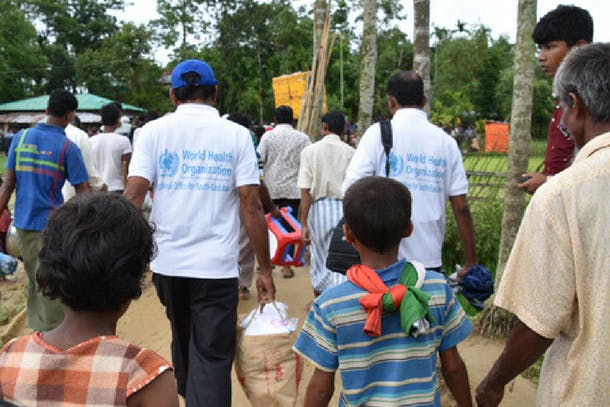
Eleven nations last week pledged an additional $15.3 million to the World Health Organization (WHO) to support the rapid response to international disease outbreaks and humanitarian health crises.
Globalization means health crises can spread faster than ever. With more people displaced worldwide than at any time in the last 75 years and weakened health infrastructure in fragile and conflict-affected areas, there is greater potential for health emergencies to arise.
We all have a stake in quickly addressing health crises, which is why the funds pledged to WHO’s Contingency Fund for Emergencies (CFE) by these 11 nations are a vital and encouraging sign of shared commitment to strengthening global health security.
The contributions from Canada, Denmark, Estonia, Germany, the Republic of Korea, Kuwait, and others ranged from $20,000 to $5.6 million – boosting the fund to $23 million total. Donor countries also included five first-time donors such as Luxembourg, Malta, and Norway.
The money is meant for emergency use, enabling WHO to immediately access funds and quickly take lifesaving action, even while other resources may be mobilized. A small upfront investment in emergency situations saves lives and dramatically reduces subsequent costs.
We applaud Member States for stepping up and giving to the fund, which was established in 2015 as part of wide-ranging reforms to allow WHO to better help countries prepare for, prevent, and respond to health emergencies and health crises. Investing in the CFE is a smart way to mitigate the rapid spread of diseases like Ebola in West Africa, which prompted the reforms.
When Crisis Hits, WHO Responds
Last year, the fund served 23 countries, with most funding released within a day.
Today, these funds are being put to work to help slow the spread of Lassa fever in Nigeria, which has killed 100 and infected 400. And with CFE support, WHO and UNICEF are joining partners to vaccinate half a million Rohingya children living in refugee settlements in Cox’s Bazar, Bangladesh, from diphtheria.
Through the CFE, WHO and its partners have responded to more than 50 disease outbreaks, crises, and disasters – sending in experts, improving disease detection and surveillance, delivering medicine and supplies, and enhancing access to water and sanitation.
“Without the CFE, recent outbreaks of Ebola in DRC, Marburg virus Disease in Uganda, and pneumonic plague in Madagascar could have gotten out of control,” said Dr. Peter Salama, WHO Deputy Director General for Emergency Preparedness and Response. “By acting decisively and quickly, we can stop disease outbreaks and save thousands of lives for a fraction of the cost of a late response. The CFE has proven its value as a global public good that should be underwritten by long-term investment.”
More Resources Are Needed
WHO is aiming for $100 million in funding for the CFE by 2018-2019, so the international community has a way to go.
In last week’s spending bill, the United States also made a step forward, earmarking $108.2 million for global public health protection in addition to robust and welcomed funding for other global health programs. This commitment is good news, but more will be needed from countries around the world to equip WHO with the necessary tools safeguard the globe’s health security.
On April 7 – World Health Day – WHO will celebrate its 70th birthday. This World Health Day, we must remind ourselves of what the world would be like without a strong WHO and redouble our efforts to support its vital contributions to advancing health for all and protecting the most vulnerable.
No one can predict what tomorrow will bring. Today, forward-thinking leaders can help WHO be prepared. The stakes are simply too high for anything else.
[Photo: WHO Bangladesh/C Bercaru]



 View All Blog Posts
View All Blog Posts